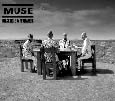Muse: Black Holes & Revelations
by Joe Sweeney

I had a conversation with a photographer a while back, during which he remarked, “I’m not a photographer. I’m an artist.” As I tried to keep from laughing out loud, I wondered whatever happened to the days when you had to earn the right to be a pompous ass. Muse is a band that performs like that photographer talks. Its fourth record, Black Holes & Revelations, is a bloated slab of progressive and alternative rock, a document of a band drowning in its own egotistical discharge. By combining seriously derivative tunes with 10th-grade, anti-establishment poetry, Muse is trying its damnedest to be important and wearing it all too obviously on their sleeves; they weren’t being ironic by putting “revelations” in the album title. The opening track, “Take a Bow,” may be the best example of this unhealthy addiction to melodrama. Opening with an ambitious, 3⁄4, synthesizer arrangement straight out of The Lamb Lies Down on Broadway, the track beckons with impending darkness and musical boldness, until singer Matthew Bellamy starts belting out the first of many rudimentary lessons about how war is bad. “You must pay for your crimes against the Earth,” Bellamy emotes in his trembling, tortured tenor. This heavy-handed angst overwhelms an otherwise promising tune—the wasted potential is heinous. From this point forward, almost every song is produced into oblivion, and every time the group’s “muse” is a little too clear, whether it’s the Cure (“Starlight”), Queens of the Stone Age (“Supermassive Black Hole”), U2 (“Invincible”) or Depeche Mode (“Map of the Problematique,” which is “Enjoy the Silence” as a regurgitated mess). Excessiveness like this used to be synonymous with rock stardom; if you weren’t over-the-top in some way, you were the Eagles. These days, we like our rock stars simpler and safer. It’s tough for a band to strut around with an air of theatrical self-importance without looking stupid, especially when they don’t have the chops to back it up. I can see what Muse is going for with Black Holes & Revelations—a crossover alternative rock album that is both glossy and revolutionary, a record that will have critics raving and young suburbanites shelling out their allowances. Unfortunately, the band got lost in its own hubris and has left us with an incredibly glossy turd.
|
Issue Navigation> Issue Index > v5n35: Face To Face (8/31/06) > Left of the Dial > Muse: Black Holes & Revelations This Week's Issue • Artvoice Daily • Artvoice TV • Events Calendar • Classifieds |









 Current Issue
Current Issue